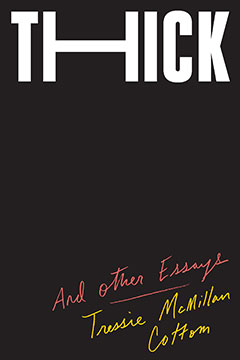 I’m not sure if I would classify Tressie McMillan Cottom’s newly released collection Thick as pure memoir, but it certainly features a cross between memoir and cultural criticism, a form becoming more common for academics and public intellectuals alike. Recently, Kiese Laymon (fiction writer and professor at the University of Mississippi) published his memoir Heavy, Rebecca Schuman published her memoir/quit lit Schadenfreude: A Love Story, and in a more traditional memoir format Nell Painter published Old in Art School, an accounting of her post academy career as an art student. Little unites these books besides form, and the impulse to write combinations of personal narrative and cultural criticism.
I’m not sure if I would classify Tressie McMillan Cottom’s newly released collection Thick as pure memoir, but it certainly features a cross between memoir and cultural criticism, a form becoming more common for academics and public intellectuals alike. Recently, Kiese Laymon (fiction writer and professor at the University of Mississippi) published his memoir Heavy, Rebecca Schuman published her memoir/quit lit Schadenfreude: A Love Story, and in a more traditional memoir format Nell Painter published Old in Art School, an accounting of her post academy career as an art student. Little unites these books besides form, and the impulse to write combinations of personal narrative and cultural criticism.
I love these books, all of them, for different reasons. But I’m also interested in what they mean for intellectual history and the way we intellectualize the academic profession. Do these books give intellectual historians of the future more, or more interesting, material? Do these books reveal something specific about the academy in 2019?
It’s not that academics have never written memoir or personal essay before. In 1938, critical theorist Walter Benjamin finished his memoir Berlin Childhood around 1900 (though it wouldn’t be published for years after his death). More than a telling of his childhood and early life, Berlin’s Childhood allowed Benjamin to theorize the context of his childhood in a Berlin that ceased to exist.
In Thick and Other Essays, Tressie McMillan Cottom writes “on one of my first forays into publishing anything, an editor told me that I was too readable to be academic, too deep to be popular, too country black to be literary, and too naive to show the rigor of my thinking in the complexity of my prose.” She analyzes her identity as an academic in the context of her positionality as a black woman writer, a successful academic, someone who has virally and publicly challenged white academic establishments.
Though these books I’ve mentioned are not considered similar, or even in the same genre, I think on some level they are all publicly challenging white academic establishments. What if an academic can also be a writer, even a literary one? What if they can make academic arguments, use footnotes, and to critical and engaged work, without publishing an academic monograph? How does this challenge the academic establishment? Or does it not? And how does it challenge our jobs as intellectual historians.

0